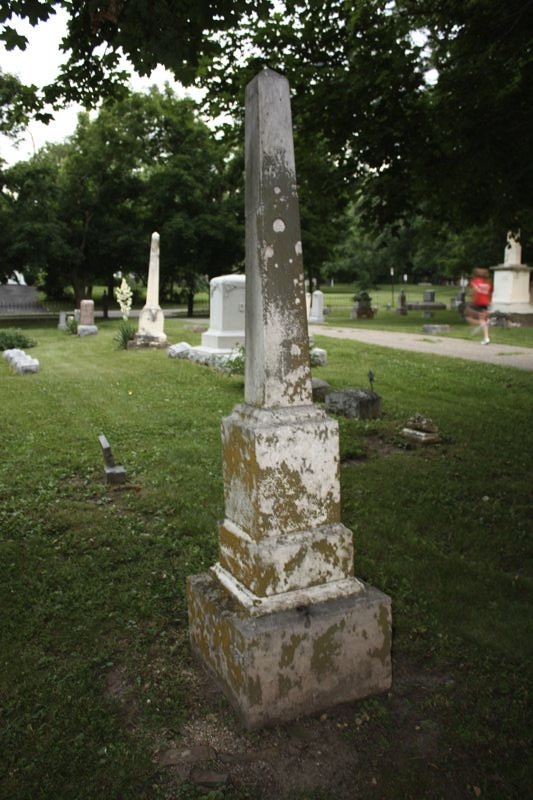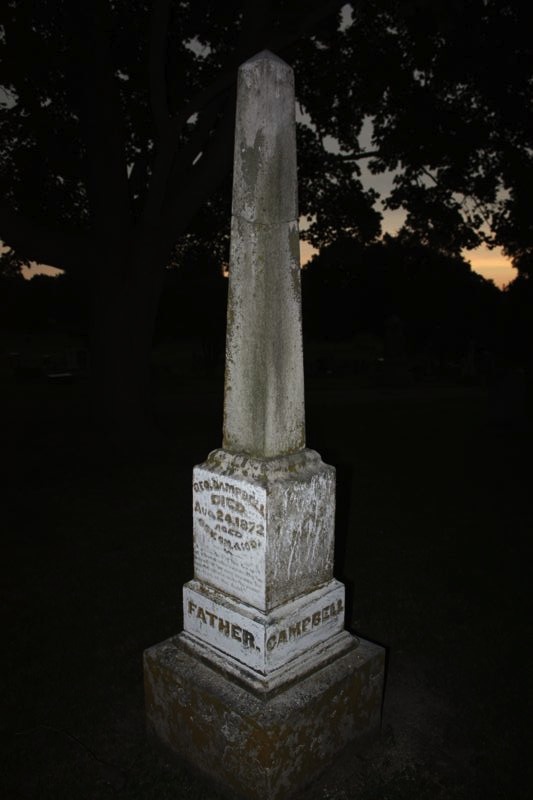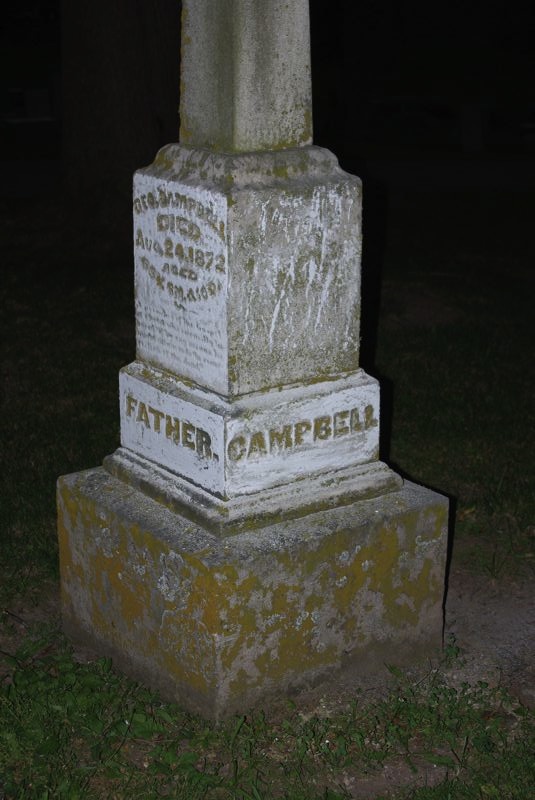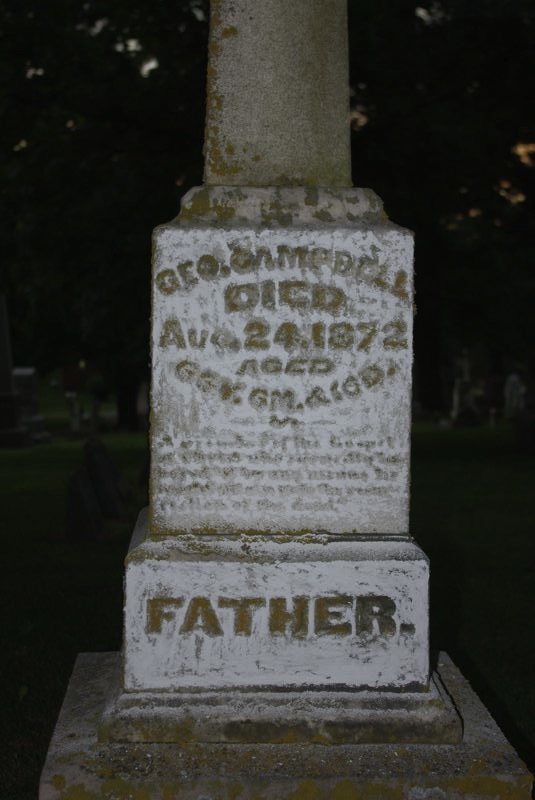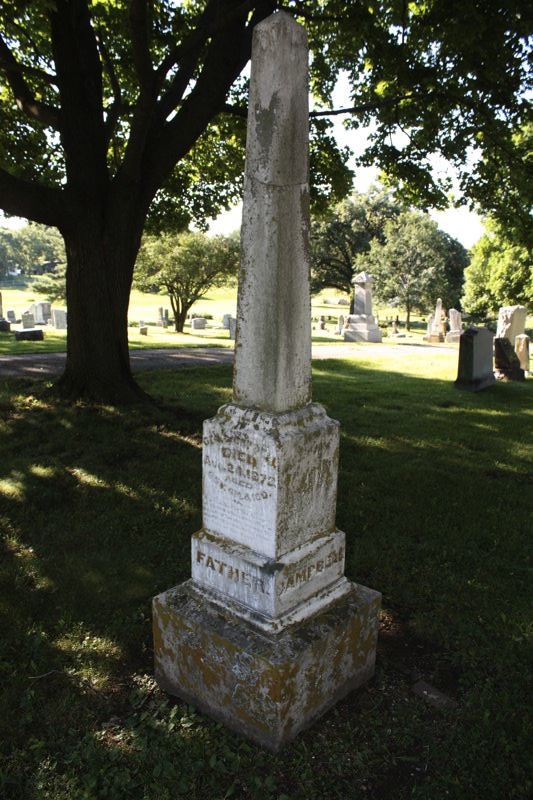George Campbell
1807-1872
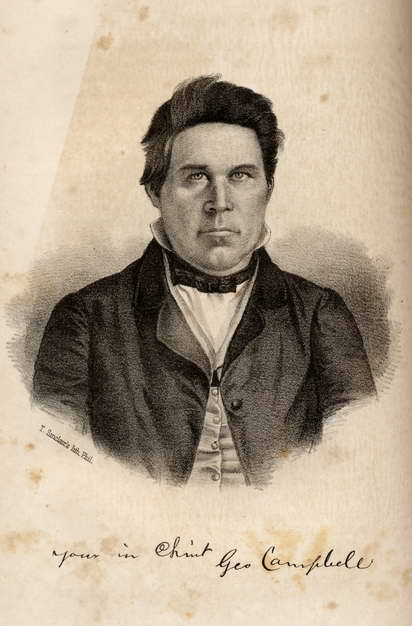
The Life Of George Campbell
Elder George Campbell was born at Brewer, Maine, on the 8th of February, 1807. He is a descendant of a somewhat distinguished family in the Highlands of Scotland. His grandfather, when quite young, emigrated to the county of Antrim, near Argyleshire, in the north of Ireland, where he married into a Protestant family by the name of Dunning. In commemoration of this part of the Emerald Isle, Elder Campbell received from his parents the name, George Argyle, which he has chosen to abbreviate to George. Soon after his marriage, and a few years prior to our Revolution, the grandfather immigrated to the New World and settled at Brunswick, in what was then the province of Maine. About the year 1774, he removed to Bangor, then a small village, on the Penobscot, at the head of tide-water. He took command of a company of patriot forces, which protected the friendly Penobscots and guarded the northeastern frontier against the depredations of the hostile Mohawks. In this position he served his county gallantly, und became widely and favorably known as Captain Campbell. Elder Campbell, in his boyhood, often sported with the famous claymore which his grandfather wielded against the Mohawks in the struggle for Independence, little dreaming that he was destined to wield, in his manhood, the mightier "sword of the Spirit," which only can make us "free indeed."
His father, Thomas Campbell, was born at Brunswick Maine, and brought up in the Presbyterian faith, which was hereditary with the Campbells, as it is with many good people even now. His mother, whose maiden name was Sabara Knapp, from whom he received his first religions impressions, was a Congregationalist, and a member of a Massachusetts family originally from Germany. Thus it happens that the blood of three different races courses his veins, blending in him the wit and eloquence of the Irishman, the vigorous intellect and untiring industry of the German, and the dauntless courage and elastic spirit of the Highlander. No wonder, therefore, that he is considered a rara avis—a remarkable character.
He was the sixth of a family of nine children, four of whom still survive. As his star arose in the East, he enjoyed better educational advantages than most of his co-laborers, who were struggling up to manhood in the wilderness of the West. When only five years old he entered the New England free-schools, which he attended regularly for six years. The next five years were devoted to hard labor on his father's farm, where he acquired the splendid physical development which has contributed so much to his intellectual vigor. At the age of sixteen he entered Foxcroft Academy, which was fortunately situated near his father's residence. Afterwards he attended the Maine Wesleyan seminary, then under the able supervision of W. C. Larrabee, late Superintendent of Public Instruction in Indiana. At a still later period, he became a student of Waterville College, where he completed the regular course to the close of the junior year. His tutor, at this Institution, was Parish Lovejoy, who, a few yearn ago, died at Alton, Illinois, a martyr to the cause of liberty and free speech. Thus it is seen that Elder Campbell, although not a graduate, has undergone rigid mental discipline, and is therefore to be reckoned among the educated men of the Reformation.
From his twenty-third to his twenty-fifth year he was a clerk in his brother's store at Arygle, Maine. While thus employed he wrote and circulated the petition to the Legislature for the incorporation of the town of Argyle, so named in memory of the land of his forefathers.
In the year 1830 he entered upon the work of the ministry among the Liberal Christians of New England. These societies were congregational, composed of Universalist Unitarians, and Free-thinkers. For a short time he was a member of the Maine Convention of Universalists, or more properly Restorationists, since they advocated the doctrine of s judgment "after death," but believed that all punishment would prove reformatory, and that, as a positive infliction, it would finally cease. During the year 1831 he preached for Unitarian Congregational Societies at Atkinson and Orono, Maine.
In 1832 he renounced all fellowship with the whole fraternity of Universalists, went to Boston, and united with the Bulfinch Street Congregational church, then under the pastoral care of the Rev. Paul Dean, who held to the strict and proper divinity of Christ. During the year 1832, and part of 1833, he studied theology under Dr. Dean, and received from the Association in Boston his license to preach. With this commendation he came to Ohio in the Summer of 1833, arriving in Cincinnati just at the breaking out of the cholera in that city. On the first Lord's day after his arrival he preached in the Unitarian church on Fourth street, and on the next day was seized with the cholera. The attack was severe, but God did not permit the silver cord to be loosed. He designed to open the blind eyes that they might yet behold wondrous thine in His law.
Having recovered from this illness, he visited his uncle, D. Campbell, in Fayette county, Indiana. Here he continued preaching theology for the space of three years; here, too, an event transpired which led to a complete revolution in his theological views. In the providence of God he had now arrived near Damascus, where the light from Heaven was to shine round about him; he had come to Ephesus, where "the way of God” was to be expounded to him "more perfectly." As this event was the pivot in his religious life, it deserves to be recorded in detail
At this time the Church of Christ at Connersville, Fayette county, was under the oversight of Elder Jesse Holton and Dr. R. T. Brown, now Professor of Natural Science in the Northwestern Christian University, and I then, as now, an efficient laborer in word and doctrine. On the arrival of the brilliant New England preacher in that community, there was no small stir among his brethren, who were almost disposed to say of his preaching, "It is the voice of a god, and not of a man”—so satisfactorily, to them, could he establish their cherished theories. They insisted that the Christians should give him a hearing, and he, in turn, was invited to come out and hear the Christians.
Not long after, when the Church of Christ at that place had assembled, "on the first day of the week to break bread," Elder Campbell entered, and seated himself near Dr. Brown. Being invited to preach, he declined. The invitation was renewed; and, thinking there must be some misunderstanding, he frankly confessed that be was not of that "way." No matter," said the doctor; "for this very reason, we desire to hear thee—what thou sayest." Consenting to preach, he took for his text, Acts xvi. 31: "Believe in the Lord Jesus Christ, and thou shalt be saved;" from which he delivered an excellent discourse relative to the power of faith to purify the heart, reform the life, and save the soul. At the close of the sermon, Dr. Brown followed with some remarks.
He heartily endorsed all that had been said of faith; "but," said he, "there are two chapters in man's life: the past, and the future. Faith, by purifying the heart now, may regulate the future; but it cannot reform the past, or blot out the transgressions that are already recorded in the book of God's remembrance." He then proceeded to show that, in the divine economy, Baptism, with its proper antecedents, is designed to free us from our "old sins," while Faith, by purifying the heart, is to prevent the occurrence of new offense, and thus present every man perfect in the sight of God. At the conclusion of these remarks Elder Campbell had described with his chair a quadrant of a circle, and was sitting directly in front of the speaker, regarding him with a look very similar, no doubt, to that of the ancient scribe when he said to the Saviour, Well, Master thou hast said the truth. Like the Scribe, too, he was then "not far from the kingdom of God."
While preparations were being made to break bread, he inquired if he would be permitted to partake with them, and received the prompt answer, "Let every man examine himself which, he says, made such an impression on his mind that, to this day, he has never ceased to "examine himself."
When the congregation retired he had a long interview with Dr. Brown. The questions they discussed engendered no strife. The one, like Aquila, confined himself to the "way of God;" the other, like Apollos, received with meekness the engrafted word; and between them that day was cemented a friendship which has never been dissolved.
Returning to his uncle's, he entered upon a thorough investigation of the doctrine of the New Testament. This he did, not to find support for any dogma, or former religious hypothesis; but devoutly to ascertain, in the light of the divine oracles, what is the religion of the Lord Jesus Christ. This investigation, which was diligently prosecuted for several months, resulted in his union with the Church of Christ at Connersville, in the year 1835. The inductive ordinance he received at the hands of Elder John Longley, now the oldest Christian preacher in Indiana.
Recommissioned by the church at Connersville, he left Fayette county in August, 1836, and soon after became the pastor of the church at Harrison, near Cincinnati. Here he remained three years; and mainly by his labors more than four hundred converts were, in that time, added to the church.
In September, 1839, he returned to Maine to see once more his aged parents and kinsmen in the flesh. Among the friends and relations who joyfully received the word, he had the pleasure of immersing into Christ his venerable mother, with whom, in former days, he had always coincided in religious views. She was a woman of exemplary piety, who, for years, had endeavored to do the will of God so far as she had been able to ascertain it. It was hers to realize the promise: "To the upright there ariseth light in the darknees." To her he was indebted for the moral and religious direction given to his young life; and her letters to him are fine models of a mother's counsel to her son.
In June, 1840, he set out on his return; passed through the Federal capital and other Eastern cities; visited the sacred spot where reposes the dust of Wsshington—then undisturbed by the shock of fratricidal war; and paused awhile at Charlottesville to see Monticello and the University of Virginia. The State Meeting of the Disciples happening to be in session, he made the acquaintance of many of the chief brethren of that State and Maryland; among whom were Elders Henshall, Goss, Coleman, and the venerable Father Ferguson. Here, too, he met his distant Scotch relative, Alexander Campbell, then in the prime and vigor of life, whose preaching on that occasion he represents as superlatively eloquent, evangelical, and edifying.
From Charlottesville he returned to Harrison, and continued to labor there and in the adjacent counties in Ohio and Kentucky, until the Spring of 1842. In April, 1841, he was married to Miss Sarah Ann Wile, a worthy sister in the Harrison church. She has been a faithful and self-sacrificing helpmate in all his toils and trials in the gospel and in the cause of education. She is now the mother of six children, five sons and a daughter, who constitute almost the whole of their earthly treasures.
In 1842 he removed with his family to a small farm near Oxford, Ohio; and became the pastor of the church at that place. Here he continued to preach, with great success, for the next three years, making occasional tours through Indiana, Kentucky, and other portions of Ohio.
In the Spring of 1845, the Rush County Evangelizing Association, in Indiana, of which the Hon. J. Helm was then President, and Hon. John L. Robinson, Secretary, called him to the work of an evangelist, and to aid in founding and building up an institution of learning in that county. Responding to this call he removed to Fairview, and in March, 1845, entered the field in Rush county. The great battle between orthodoxy and that which they called heresy was then going on in that county, in which conflict he engaged with all boldness and bent his bow valiantly for the truth.
In the fall of that year he resigned his position as evangelist of the Association and took charge of the Farmington Academy, which maintained a good reputation during his administration. It was subsequently transferred to Fairview, where it continues to flourish, Elder Campbell being the President of the Board of Directors.
At the State Meeting of the Brotherhood of Indiana, held at Greensburg, Decatur county, in 1847, he introduced a resolution in favor of building up in the State an Institution of learning of the highest grade. This, so far as is known to the writer, was the first movement toward the founding of the Northwestern Christian University, an institution already second to none in the State, and which, if completed on the scale of the projectors, will be second to but few on the continent. The discussion of the said resolution led to the appointment of the University Committee, which was composed of James M. Mathes, Elijah Goodwin, L. H. Jameson, Ovid Butler, and John O'Kane; all of whom were from that time active co-workers in behalf of the enterprise. At the next Annual Meeting they reported in favor of establishing the University, which was subsequently located at Indianapolis, according to a vote of the churches throughout the State. The following year, the State Meeting appointed as their agent, Elder John O’Kane, who obtained the subscription requisite for the organization of the Institution. Elder Campbell was one of the original commissioners appointed by the Legislature, and at the organization he was chosen one of the members of the Board of Directors, which position he still occupies, having been twice re-elected.
In April, 1848, he removed to Cincinnati and became pastor of the Church of Christ in Fulton, dividing his time between that church and his old charge at Harrison. This year he assisted Elder Walter Scott in the removal of the "Protestant Unionist" from Pittsburg to Cincinnati; and ably conducted the paper in the absence of the editor. He also rendered important service to Dr. Horatio P. Gatchel in bringing out the republication of “McLane on the Commission,” a work that has greatly contributed to the progress of the Reformation.
Near the close of 1848, he, with others, purchased the "Protestant Unionist," which, on the 1st of Januery,l849, was superseded by the "Christian Age," of which Dr. Gatchel and T. J. Melish were editors. In a short time Dr. Gatchel sold his interest in the paper, and the name of George Campbell appeared as one of its editors. During the absence of Elder Melish, and during the prevalence of the cholera in the Summer and Autumn of 1849, Elder Campbell had the sole charge and management of the paper. Aided by Elder James Challen, he conducted, in its columns, a discussion relative to the propriety of calling a convention for the purpose of organizing a general Missionary Society. He and Elder Challen successfully plead the affirmative of the proposition until the convention was called and the American Christian Missionary Society was formed. Probably this enterprise was first suggested by Elder Challen; but once suggested it found an earnest, able, and persevering advocate in the person of Elder Campbell. Of the Executive Board of this Society he has always been an efficient member, and much of the time one of its general traveling agents.
In the fall of 1849 Elder Melish transferred his share of the "Christian Age” to Elder D. S. Burnett, who then became the principal editor. Elder Campbell then bade adieu to the sanctum and the city; returned to Rush county, and entered again upon the work of an evangelist. He also assisted Prof. A. R. Benton (now President of the N. W. C. University) in the Fairview Academy; and regularly contributed to the "Christian Age," of which be continued joint proprietor and associate editor.
In 1851 he sold his share of the paper to Elder Benjamin Franklin, but still contributed to its columns, until, after so many changes, it finally fell entirely into the bands of Elder Franklin. Not long after this it died, but by a happy transmigration of soul it soon re-appeared in the present well-known weekly, "The American Christian Review." Of this paper Elder Campbell has been an occasional correspondent. Indeed, he has contributed more to our periodical literature than is generally known. Aside from his editorials, he has furnished occasional articles for the Millennial Harbinger, Western Reformer, Ohio Preacher, Christian Family Library, Western Evangelist, Christian Record, and Christian Luminary. He writes forcibly in very plain style. As when one sees him, it is the man, and not the dress, that attracts the eye; so when one reads him, it is the idea, and not the language, that fixes the attention. He employs no grievous words that stir up strife; but his articles are deeply imbued with that charity that "thinketh no evil." His pen addresses itself ad rem, and not ad hominem.
Being employed by the State Meeting as a home missionary in Northern Indiana, he spent the Winter of 1853 in that field, which embraced the counties of Porter, La Porte, and St. Joseph. Here, in co-operation with brethren R. Wilson and D. Miller, he reconstructed the prostrate church at Mishawaka. This had been a powerful church, but political commotions and various other wranglings had destroyed its influence and laid it in ruins. Its successful reconstruction gave a new impulse to the cause of primitive Christianity in Northern Indiana, which is now a great field "ripe for the harvest."
He finally removed to the northwestern part of the State, and fixed his residence at Oxford, the county seat of Benton county. Soon after this removal, assisted by Elders John Longley, H.R. Pritchard, and J.O. Johnson, under a great oak tree on his own premises, he organized the Church of Christ at Oxford. This was the first church planted at that place; and it was the first house of worship erected in Benton county. It has continued to increase by the edifying of itself in love, until it now numbers nearly eighty members, and is in a prosperous condition.
These missionary labors were to him "the heat and burden of the day." Under their pressure his constitution so far gave way that, from 1854 to 1859, he was never in perfect health even for a single day. Still he remained at his post; often preaching during the paroxyam of either chill or fever; organizing churches in Benton, Warren, Tippecanoe, Le Porte, and Montgomery counties; and introducing the ancient gospel into various places in Illinois, Ohio, and Kentucky.
In December, 1858, he removed to Burnettsville, in White county, for the sake of the educational advantages afforded to his children by the Indiana Normal Institute located at that place. Here he was made the general agent of the Institute; and, besides extensive evangelising operations, he raised by subscription over three thousand dollars for the erection of a new building. This excellent high school is now in successful operation in the new edifice, which is another beautiful monument erected by Elder Campbell in the cause of education.
During the two years' residence at Burnettsville he added sixty-nine to the assembly of the saints; and through the instrumentality of that church several promising students of the Institute have been sent forth into the harvest. These two years, however, he mainly spent abroad; the first as evangelist, the second as agent of the American Christian Missionary Society. In both these departments his labors produced abundantly the peaceable fruits of righteousness.
In December, 1860, he moved back to his old home at Fairview, Rush county, whence he causes the light of truth to radiate. There he happily resided, surrounded by confiding, warm-hearted brethren, very many of whom are his own sons in the gospel. There we leave him, and close the record of his deeds.
The exact number that have been redeemed through his instrumentality cannot be given. Of these he has kept no record, trusting that their names will all be found written in the Lamb's book of life. But, wherever he has preached the word, the disciples have been multiplied greatly; and in the counties of Rush and Fayette, where, with Elders Reeve and Thompson, he has labored so long, multitudes have obeyed the ancient gospel, and its claims are so generally acknowledged that an angel from heaven would perhaps meet with very little success were he to declare in those counties "any other gospel."
He has unbounded confidence in the ultimate triumph of the cause for which he has plead, and to which he has devoted the affections of his heart, the energies of his life, and the most of his earthly substance.
In the providence of God his health has been completely restored, so that he rejoices not only in view of the triumph of Truth, but also in the prospect of long life. He yet possesses a vigorous mind, a stout heart, and a firm purpose to devote his earthly future as he has his pest, assured that for all his sacrifices in the life that now is, God will restore him a hundred fold in the life that is to come.
Elder Campbell is about five feet seven inches in height, and not quite so much in circumference. He is heavy set, weighing about two hundred pounds; and although his heart may sornetimes falter, his flesh never fails him. His head is very large, and in such close proximity to his shoulders that an observer once said of him, "That man has no neck." It is overgrown with a heavy crop of short, coarse, bristly hair, which, as often as he beholds his natural face in a glass, affords him an example of uprightness. He walks like every other fat man, and sits down, when duty permits, with evident satisfaction. The portrayal of his features must be left to the engraver.
His dress is eminently in keeping with his person—rough and serviceable. In its selection he consults comfort, not fashion. His cravat is never of ministerial white, and it very often fronts to one side. He leans upon no staff save that which supported David; and displays no golden chain but love. In a word, he takes no thought for the outward adorning “of wearing of gold and putting on of apparel.”
His habits—those immaterial garments that envelop the inner man, the soul, and form the character as material garments do the dress—are equally becoming. There is no studied concealment of defects—no egotistical display of virtues. His character, like his body, stands before you in bold, distinct outline. Its principal traits are thus given in an article from the pen of Elder James Challen, than whom, perhaps, no one knows them better:
"He is possessed of a sound judgment, a vigorous understanding, a quick perception, considerable compass of thought, and a power of keeping his mind in abeyance until be has fairly reached his conclusions; and, when reached, he holds on to them with singular tenacity. He is not satisfied with looking at a subject simply in one direction, but seeks to examine it in all its bearings and relations.
"He is a lover of the truth, and is never weary in its pursuit. His thirst for knowledge is at times a passion—an appetite—and his application unwearied and constant. He is possessed of great simplicity of character: kind, confiding, and full of warm and strong attachments, which make him a most agreeable companion. He is utterly devoid of all envy and jealousy, and free from every ungenerous suspicion. A constant and devoted friend, a cheerful, pleasant, and profitable companion.
"His skill lies chiefly as an evangelist over large fields. He easily adapts himself to every situation in life and class of society; chiefly to the more humble and hardworking. With these he is a special favorite, and is held in high estimation for his plainness and simplicity."
He is a friend in deed to the missionary cause. Operating much of his time in large fields, he realizes that the harvest is great; he therefore prays the Lord to send forth laborers into his harvest, and exerts himself to obtain means for their support. Believing of a truth that faith comes by hearing the word of God, and that salvation is through faith, he does all in his power to send that word to those who sit in darkness and the shadow of death.
The cause of education also finds in him a zealous advocate and a liberal contributor. While others have endeavored to accumulate silver and gold, and houses and lands for their children, he has beneficently applied the most of his goods, that, by so doing, he might lay up for himself a good foundation against the time to come. "Let the light enter," is his motto; and his heart's desire is to see the sons of our country grow up as fruitful plants and her daughters be polished after the similitude of a palace.
As a preacher he is plain, pointed, didactic. His sermons are not pleasure parks with their flowery walks, refreshing shades, and fountains spanned by rainbows; but rugged mountains rather, full of useful materials, based on the Rock of ages, their sun-lit tops pointing to Heaven. His subject is often a most familiar passage, and the instruction drawn from it is generally of a practical character. If he employs a figure, it is more for strength than for beauty. If he makes a quotation, it is oftener from the apostles than from the poets—an assertion which is not true of all preachers. There is no effort to gratify itching ears, but an earnest purpose to reach the candid heart; no bombastic flights of fancy, no superfluity of feigned pathos; but in their stead there is depth, solidity, originality, genuine earnestness, and, above all, the truth as it is in Jesus. One is not apt, therefore, to become a weary listener; more probably his heart will. burn within him while the Scriptures, in their ancient simplicity, are being opened to his understanding.
He has a strong, deep voice, and his loud, rapid, and sometimes vociferous utterance has won for him the sobriquet, Boanerges. When excited he gesticulates violently in every direction, and according to no prescribed rules. He apparently loses all knowledge of himself in his subject, and feeling the importance of his theme himself, he easily makes others feel it. He closes every discourse with a powerful exhortation, in which his voice sometimes rises to the highest pitch, and his vehemence kindles into the most impassioned eloquence.
He is not generally regarded as a formidable controversialist; yet in his hands the weapons that are not carnal are mighty to the pulling down of strongholds, and every thing that exalts itself against the knowledge of God. He has never hesitated to assault error, and his attacks have been more successful than those of many who are flattered as champions of truth. But while others have used harsh epithets in public discussions with those whose prejudices were so excited that they were unable to discover the right, he has in meekness instructed those that oppose themselves; and, by a quiet victory, brought them to the acknowledgment of the truth.
There is another trait in his character as an evangelist that deserves to be presented, that it may be imitated. He is a peace-maker. Perhaps no man in the Reformation has been more successful in reconciling brethren at variance, and in reconstructing churches destroyed by schism. He is a most zealous advocate of union among all the followers of Jesus, and an ardent opposer of whatever tends to sow discord among brethren. Though he resembles Peter in his elocution, and Paul in his reasoning, he is most like the beloved John, the burden of whose doctrine was, Little children, see that you love one another. May the children of the kingdom among whom he has gone preaching, hearken to his wholesome admonitions—may they “do all things without murmuring and disputings, that they may be blameless and harmless, the sons of God without rebuke in the midst of a crooked and perverse nation; and that he may rejoice in the day of Christ that he has not run in vain, neither labored in vain.
—Biographical Sketches of the Pioneer Preachers In Indiana – Madison Evans, 1862, pages 315-330
![]()
Directions to the Grave Of George Campbell
George Campbell died August 24, 1872 at sixty-five years of age. He was buried in the Olio Township Cemetery, also known as Eureka Cemetery in Eureka, Illinois. His son, Charles W. Campbell, was a prominent leader among churches in Illinois, and lived for a time in Eureka. The city of Eureka is located just east of Peoria on Hwy. 24. In the town center turn right on Hwy. 117. and go past Eureka College, and you will see the cemetery on the left. This cemetery was at one time the old Eureka Christian Church Cemetery. The building has long been gone. Enter into the main entrance of the cemetery and take the second drive to the left. Go past midway of the section. Stop the car. Go into the section to the left. The Campbell monument is under an good sized tree. The years have been unkind to the monument as it is gradually fading. Much of the small print markings were not legible.
GPS Location
40°42.704' x 89° 16.321'
Or, D.d. 40.711746,-89.271923
Grave Facing East
Location in Cemetery: Div A Section C Lot 6 Grave 11
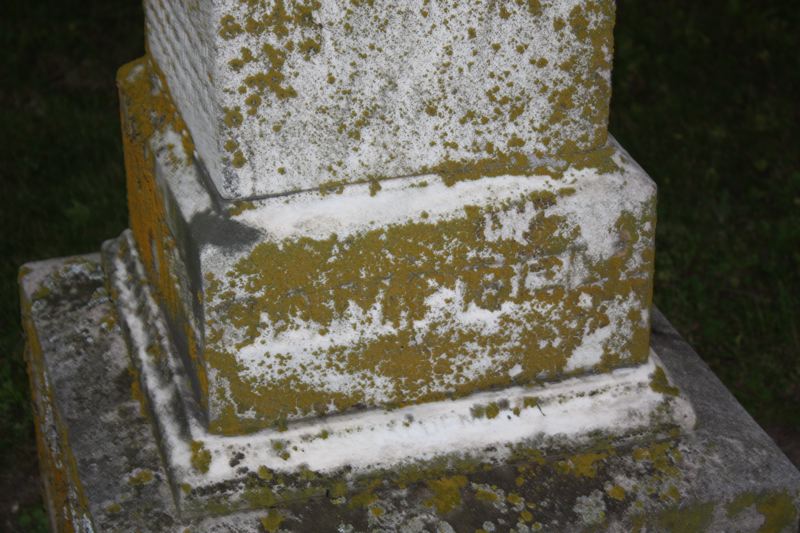
Geo. Campbell
Died
Aug. 24, 1872
Aged
65Y, 6M, 10D
A Minister of the Gospel
?????
______
FATHER
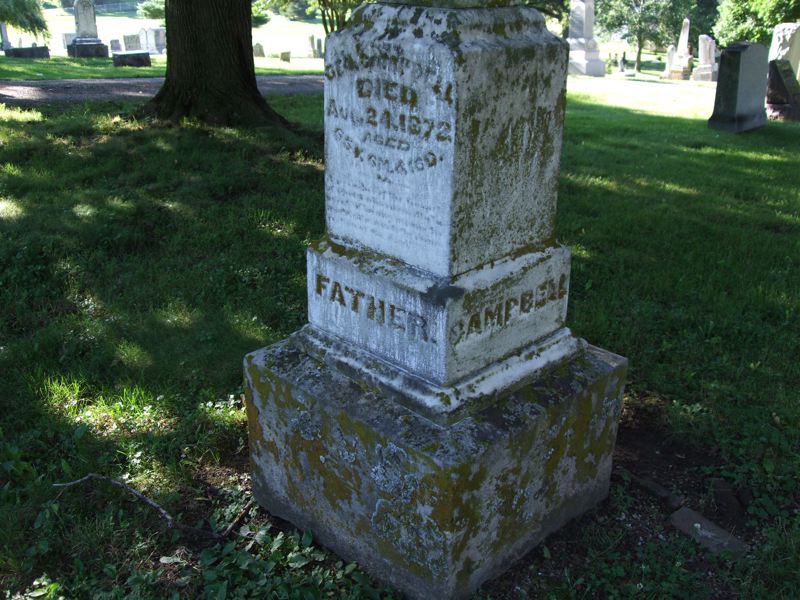
![]()
Special Thanks
In June, 2009 Tom L. Childers, C. Wayne Kilpatrick and Scott Harp traveled about 3000 miles in one week through parts of Tennessee, Missouri, Illinois, Indiana and Kentucky. During this time we found the graves of 75 church leaders in the Restoration Movement. Chronicling these leaders into websites has been time consuming. Many thanks to Tom and Wayne in helping to take photos, share the driving, and putting up with your web master's slave-driving effort to see as many as we did in the time we had. Their photos as well as some of mine are seen on this site. When we arrived at Olio Twp Cemetery, it was late in the evening, and a summer storm was on its way. I had called Rosemary Hartter, the manager of the cemetery, weeks in advance to gather information. When we arrived on Saturday evening, I called her and she was most gracious to come to the cemetery after hours to assist us in finding all the graves. She and the staff at the cemetery have been most gracious to help, and for this we say a special thanks to them.
![]()
